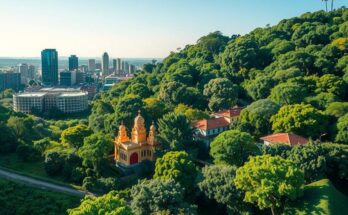The Democratic Republic of the Congo faces renewed conflict as M23 rebels, allegedly backed by Rwanda and Uganda, capture regions like Goma amid widespread violence. The situation recalls past wars that resulted in millions of deaths and extensive humanitarian crises. Analysts warn of potential regional escalation. Current dynamics reveal the ongoing consequence of historical grievances, corruption, and resource exploitation, necessitating political negotiation and accountability to ensure lasting peace.
The ongoing conflict in the Democratic Republic of the Congo (DRC) reflects a troubling resurgence of violence as M23 rebels advance towards Kinshasa, capturing significant regions such as the eastern cities of Goma and Bukavu. Communities are either rallying for war or fleeing for safety amidst the chaos, with the UN reporting that the rebels have support from Rwanda and that approximately 7,000 lives have been lost due to fighting this year alone. Despite a $5 million bounty placed on M23 leaders by the DRC government, the group remains undeterred.
While the M23 rebels progress in the provinces of North and South Kivu, Ugandan troops have heightened their presence along the DRC border, reportedly combating the Allied Democratic Forces (ADF) and the Cooperative for the Development of Congo (CODECO). A recent resurgence of CODECO violence led to a tragic loss of 51 civilian lives, prompting additional Ugandan military deployment in the area. Observers note that the current situation eerily mirrors the historical conflicts that plagued the region, with fears of escalating into a broader war among neighboring countries.
Political analyst Paul Nantulya has stated, “We are indeed seeing a replica of the Second Congo War…”, highlighting the repetitive patterns of regional engagement that not only threaten local stability but also reignite memories of a painful history. The Second Congo War, or the “Great Africa War,” involved several African nations and resulted in immense humanitarian devastation, including an estimated five million casualties.
The complex factors fueling this prolonged unrest include Rwanda’s grievances related to exiled rebels and the quest for natural resources, exacerbated by the DRC’s internal corruption and ethnic divisions. Historical invasions by Rwanda seeking to neutralize Hutu threats have created a cycle of conflict, with foreign and local militias vying for control over the DRC’s rich mineral resources.
Although the Congo wars officially concluded in 2003, sporadic clashes persist, giving rise to allegations of looting and human rights violations by Rwandan and Ugandan forces during their military presence in the DRC. Reports indicate that natural resource exploitation became a means of financing armed conflicts, leading to criminal activities involving high-profile political and military figures from the region. The International Court of Justice (ICJ) has held Uganda accountable for its past actions.
As the M23 progresses towards Kinshasa, Congolese politician Corneille Nangaa has aligned himself with the rebels, suggesting ongoing interference from neighboring countries. Some analysts indicate that Uganda’s involvement remains ambiguous, as it navigates its strategic interests while denying direct support for M23. Furthermore, the situation in the DRC is compounded by widespread humanitarian issues, which analysts argue require extensive diplomatic efforts to resolve the crisis.
Promotion of national dialogue and international scrutiny of all parties involved is imperative to address the ongoing violence. Recent engagements, including discussions led by regional powers and international legal authorities, signal a potential pivot towards accountability and peace. Kambale Musuvali emphasizes that the Congolese populace must be prioritized, stating, “What about the [Congolese] people? … DRC needs a break. Not just for themselves, but for the entire African continent.”
The conflict’s resolution depends not only on addressing foreign interventions but also on rectifying the DRC’s internal governance failures. Analysts unanimously agree that without comprehensive dialogue and structural reforms, the cycle of violence is likely to persist, profoundly affecting both the DRC and the broader African landscape.
The conflict in the Democratic Republic of the Congo illustrates a persistent cycle of violence deeply rooted in historical grievances, foreign interference, and resource exploitation. The resurgence of M23 rebels and the involvement of Rwandan and Ugandan troops raise concerns of a wider regional conflict reminiscent of the past. Effective resolution necessitates serious political negotiations, accountability for human rights violations, and systemic governance reforms within the DRC to ensure stability and improve the humanitarian situation. As highlighted by Kambale Musuvali, the focus must remain on the well-being of the Congolese populace, as their recovery is pivotal for broader regional peace.
Original Source: www.aljazeera.com




